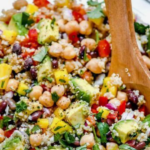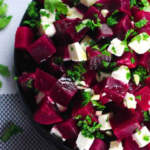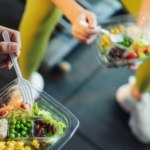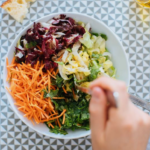2246 words / 11376 characters
Unlocking the Secrets: Harnessing the Power of Nutrition for Sustainable Weight Loss

Photo by PaliGraficas on Pixabay
## The role of nutrition in weight loss
When it comes to weight loss, the role of nutrition cannot be overstated. What we eat plays a crucial role in our overall health and well-being. But it’s not just about counting calories or following the latest fad diet. It’s about understanding the power of nutrition and how it can help us achieve sustainable weight loss.
Nutrition is the science of food and how it affects our body. By choosing the right foods and eating in a balanced way, we can fuel our bodies with the nutrients they need while also promoting weight loss. But it’s important to remember that nutrition is not just about what we eat, but also how we eat.
Understanding macronutrients and their impact on weight loss
Macronutrients, or macros for short, are the three main components of our diet: carbohydrates, proteins, and fats. Each macronutrient plays a unique role in our body, and understanding their impact on weight loss is key to achieving our goals.
Carbohydrates are our body’s primary source of energy. They provide fuel for our muscles and brain, but not all carbs are created equal. Simple carbs, like those found in sugary snacks and processed foods, can cause blood sugar spikes and lead to weight gain. On the other hand, complex carbs, like those found in whole grains and vegetables, provide a steady release of energy and help us feel full for longer.
Proteins are the building blocks of our body. They are essential for repairing tissues, building muscle, and supporting a healthy metabolism. Including lean sources of protein, such as chicken, fish, and legumes, in our diet can help us feel satisfied and maintain muscle mass while losing weight.
Fats are often seen as the enemy when it comes to weight loss, but they are actually an important part of a healthy diet. Healthy fats, like those found in avocados, nuts, and olive oil, help us absorb vitamins, regulate hormones, and keep us feeling full. It’s important to choose the right types and amounts of fats to include in our diet for optimal weight loss.
The power of portion control in sustainable weight loss
Portion control is a powerful tool when it comes to sustainable weight loss. It’s not just about what we eat, but how much we eat that matters. By understanding portion sizes and practicing mindful eating, we can take control of our calorie intake and achieve long-term success.
One simple way to practice portion control is by using smaller plates and bowls. Research has shown that we tend to eat more when our plates are larger, as we subconsciously fill them up. By using smaller plates, we can trick our brain into thinking we’re eating more than we actually are.
Another helpful strategy is to listen to our body’s hunger and fullness cues. It takes time for our brain to register that we’re full, so eating slowly and savoring each bite can help us avoid overeating. Additionally, paying attention to portion sizes and using measuring cups or a food scale can give us a better understanding of how much we’re actually eating.
By practicing portion control, we can still enjoy our favorite foods while also achieving our weight loss goals. It’s all about finding the right balance and making conscious choices.
The importance of balancing your diet for long-term success
When it comes to weight loss, balance is key. A well-balanced diet ensures that we’re getting all the nutrients our body needs while also promoting weight loss. It’s not about cutting out entire food groups or following extreme diets, but rather about making informed choices and finding the right balance for our individual needs.
Balancing our diet means including a variety of foods from each food group. This ensures that we’re getting a wide range of nutrients, vitamins, and minerals. It’s important to include plenty of fruits and vegetables, whole grains, lean proteins, and healthy fats in our diet.
In addition to balancing our macronutrients, it’s also important to pay attention to our micronutrient intake. Micronutrients, such as vitamins and minerals, play a crucial role in our overall health and well-being. Including a variety of colorful fruits and vegetables in our diet can help us meet our micronutrient needs and support our weight loss journey.
Remember, balance is not about perfection. It’s about making small, sustainable changes that we can stick to in the long run. By finding the right balance for our individual needs and preferences, we can achieve sustainable weight loss and improve our overall health.
Incorporating mindful eating practices into your weight loss journey
In our fast-paced world, it’s easy to eat mindlessly. We often eat on the go, while watching TV, or while scrolling through our phones. But practicing mindful eating can help us reconnect with our body’s hunger and fullness cues, leading to more enjoyable and sustainable weight loss.
Mindful eating is about paying attention to the present moment and fully experiencing our food. It involves eating slowly, savoring each bite, and really tasting the flavors and textures. By slowing down and focusing on our meal, we can better recognize when we’re satisfied and avoid overeating.
One helpful practice is to remove distractions while eating. Turn off the TV, put away your phone, and create a peaceful environment where you can fully enjoy your meal. Take the time to chew your food thoroughly and really savor each bite.
Another helpful strategy is to tune in to your body’s hunger and fullness cues. Before reaching for a snack, ask yourself if you’re truly hungry or if you’re eating out of habit or boredom. Similarly, pay attention to how your body feels as you eat. Are you starting to feel satisfied? Are you still hungry? By tuning in to these cues, you can better understand your body’s needs and eat accordingly.
Incorporating mindful eating practices into your weight loss journey can help you develop a healthier relationship with food and achieve long-term success. It’s about nourishing your body and soul, one mindful bite at a time.
The benefits of meal planning and prepping for weight loss
Meal planning and prepping can be powerful tools when it comes to weight loss. By taking the time to plan and prepare your meals in advance, you can save time, money, and make healthier choices.
One of the biggest benefits of meal planning is that it helps you stay on track with your weight loss goals. When you have a plan in place, you’re less likely to reach for unhealthy convenience foods or order takeout. Instead, you can enjoy nutritious meals that support your weight loss journey.
Meal prepping also allows you to control portion sizes and ensure that you’re getting a balanced meal. By preparing your meals in advance, you can measure out appropriate portions and include a variety of fruits, vegetables, proteins, and grains. This can help you avoid overeating and ensure that you’re getting all the nutrients your body needs.
Additionally, meal planning and prepping can help you save time and money. By preparing your meals in advance, you can avoid last-minute trips to the grocery store or expensive takeout meals. It also allows you to make use of leftovers, reducing food waste and saving money in the process.
To get started with meal planning and prepping, take some time each week to plan out your meals. Make a grocery list and stock up on healthy ingredients. Then, set aside a few hours to prepare your meals in advance. You can portion them out into individual containers or freeze them for later use.
By incorporating meal planning and prepping into your weight loss journey, you can set yourself up for success and make healthy eating a breeze.
How to navigate through fad diets and find a sustainable approach to nutrition
In the world of weight loss, fad diets are everywhere. From juice cleanses to extreme low-carb diets, it can be overwhelming to know which approach to follow. But the truth is, most fad diets are not sustainable or healthy in the long run.
Instead of jumping on the latest diet trend, it’s important to take a step back and evaluate your goals and needs. Ask yourself what you’re looking to achieve with your weight loss journey and what approach will work best for you.
A sustainable approach to nutrition is one that promotes long-term health and well-being. It’s about finding a balance between enjoying your favorite foods and making healthier choices. It’s about nourishing your body with wholesome, nutrient-dense foods that support your weight loss goals.
To find a sustainable approach to nutrition, consider seeking guidance from a registered dietitian or nutritionist. They can help you create a personalized plan that takes into account your individual needs, preferences, and goals. They can also provide ongoing support and guidance as you navigate your weight loss journey.
Remember, there is no one-size-fits-all approach to nutrition. What works for one person may not work for another. It’s important to find what works best for you and to listen to your body’s needs.
The role of exercise in conjunction with a nutritious diet for weight loss
While nutrition plays a key role in weight loss, exercise is also an important component. It’s not just about burning calories, but also about strengthening your body, boosting your metabolism, and improving your overall health.
Exercise helps to create a calorie deficit, which is necessary for weight loss. By burning more calories than you consume, your body starts to tap into its fat stores for energy, leading to weight loss. But exercise is not just about burning calories during your workout; it also helps to increase your metabolism, which means you’ll continue to burn calories even after your workout is over.
In addition to its weight loss benefits, exercise also has numerous other health benefits. It can help improve cardiovascular health, strengthen your muscles and bones, reduce stress, and boost your mood. Regular exercise is also associated with a reduced risk of chronic diseases such as heart disease, diabetes, and certain types of cancer.
When it comes to exercise, finding activities that you enjoy is key. Whether it’s going for a walk, taking a dance class, or lifting weights, find something that makes you feel good and that you can stick to in the long run. Aim for a combination of cardiovascular exercise, such as brisk walking or cycling, and strength training exercises that target all major muscle groups.
Remember, exercise should be seen as a complement to a nutritious diet, not a way to “burn off” the foods you eat. It’s about taking care of your body and improving your overall health.
Tracking your progress and making adjustments along the way
Tracking your progress is an important part of any weight loss journey. It allows you to see how far you’ve come, identify areas for improvement, and make necessary adjustments along the way.
One of the most effective ways to track your progress is by keeping a food journal. This involves writing down everything you eat and drink throughout the day, along with portion sizes and any other relevant information. By keeping track of your food intake, you can identify patterns, such as emotional eating or mindless snacking, and make changes as needed.
Another helpful tool is a fitness tracker or smartphone app that can track your physical activity and calorie burn. These devices can provide valuable insights into your activity levels and help you set goals for yourself.
In addition to tracking your food and exercise, it’s also important to track your measurements and how you feel. Take note of how your clothes fit, how your energy levels are, and how you’re feeling mentally and emotionally. These non-scale victories can be just as important as the number on the scale.
As you track your progress, don’t be afraid to make adjustments along the way. If something isn’t working for you, try a different approach. Experiment with different foods, exercise routines, and strategies until you find what works best for you.
Conclusion: Embracing the power of nutrition for sustainable weight loss
When it comes to weight loss, nutrition is a powerful tool. By harnessing the power of nutrition and making informed choices, we can achieve sustainable weight loss and improve our overall health and well-being.
Understanding macronutrients, practicing portion control, and balancing our diet are all important aspects of a nutritious approach to weight loss. Incorporating mindful eating practices, meal planning, and prepping can help us make healthier choices and save time and money. By navigating through fad diets and finding a sustainable approach to nutrition, we can set ourselves up for long-term success.
Remember, weight loss is not just about the number on the scale. It’s about nourishing our bodies, taking care of our health, and embracing a lifestyle that supports our goals. By embracing the power of nutrition, we can unlock the secrets to sustainable weight loss and live our best lives.
- Quinoa Salad Recipe
 Quinoa salad is a nutritious and versatile dish that combines fluffy quinoa with an array of fresh vegetables, herbs, and a zesty dressing. This colorful salad is packed with protein, fiber, vitamins, and minerals, making it a satisfying and wholesome meal or side dish that’s perfect for any occasion. Origin and Cultural Significance:Quinoa, a nutrient-rich …
Quinoa salad is a nutritious and versatile dish that combines fluffy quinoa with an array of fresh vegetables, herbs, and a zesty dressing. This colorful salad is packed with protein, fiber, vitamins, and minerals, making it a satisfying and wholesome meal or side dish that’s perfect for any occasion. Origin and Cultural Significance:Quinoa, a nutrient-rich … - WellnessPlus: Comprehensive Coverage with Healthy Recipe Benefits
 Introduction:WellnessPlus offers more than just traditional insurance coverage; it provides a holistic solution that integrates comprehensive insurance benefits with healthy recipe benefits. With WellnessPlus, you not only receive essential coverage for your health needs but also gain access to a wealth of resources to support your well-being through nutritious and delicious meals. Comprehensive Coverage:At WellnessPlus, …
Introduction:WellnessPlus offers more than just traditional insurance coverage; it provides a holistic solution that integrates comprehensive insurance benefits with healthy recipe benefits. With WellnessPlus, you not only receive essential coverage for your health needs but also gain access to a wealth of resources to support your well-being through nutritious and delicious meals. Comprehensive Coverage:At WellnessPlus, … - Fit & Flavorful: Insurance That Supports Your Health Journey
 Introduction:Fit & Flavorful isn’t just about insurance; it’s a comprehensive support system designed to enhance your health journey. By integrating insurance coverage with personalized resources, Fit & Flavorful empowers you to prioritize your well-being while enjoying delicious and nutritious meals. Comprehensive Coverage:At Fit & Flavorful, we understand that health is a journey, and our insurance …
Introduction:Fit & Flavorful isn’t just about insurance; it’s a comprehensive support system designed to enhance your health journey. By integrating insurance coverage with personalized resources, Fit & Flavorful empowers you to prioritize your well-being while enjoying delicious and nutritious meals. Comprehensive Coverage:At Fit & Flavorful, we understand that health is a journey, and our insurance … - NutriWise: Smart Coverage for Healthy Living
 Introduction:NutriWise doesn’t just provide standard insurance coverage; it offers a smart solution tailored to support and enhance your journey toward healthy living. By combining comprehensive insurance with personalized resources, NutriWise empowers you to make informed choices and achieve optimal wellness. Comprehensive Coverage:At NutriWise, we understand that health encompasses more than just medical care; it’s about …
Introduction:NutriWise doesn’t just provide standard insurance coverage; it offers a smart solution tailored to support and enhance your journey toward healthy living. By combining comprehensive insurance with personalized resources, NutriWise empowers you to make informed choices and achieve optimal wellness. Comprehensive Coverage:At NutriWise, we understand that health encompasses more than just medical care; it’s about … - VitalityPlus: Insurance and Recipes for a Vibrant Life
 VitalityPlus isn’t just about insurance coverage; it’s a comprehensive solution designed to help you lead a vibrant and healthy life. Our unique approach integrates traditional insurance benefits with personalized recipes and nutritional guidance to support your well-being on all fronts. At VitalityPlus, we understand that true vitality comes from a combination of factors – including …
VitalityPlus isn’t just about insurance coverage; it’s a comprehensive solution designed to help you lead a vibrant and healthy life. Our unique approach integrates traditional insurance benefits with personalized recipes and nutritional guidance to support your well-being on all fronts. At VitalityPlus, we understand that true vitality comes from a combination of factors – including … - RecipeCare: Ensuring Health Through Insurance and Nutrition
 RecipeCare offers a unique approach to healthcare that combines the essential benefits of insurance with personalized nutritional support. Our mission is simple: to ensure your health and well-being through comprehensive coverage and tailored nutrition guidance. At RecipeCare, we understand that true health encompasses more than just medical care – it also involves nourishing your body …
RecipeCare offers a unique approach to healthcare that combines the essential benefits of insurance with personalized nutritional support. Our mission is simple: to ensure your health and well-being through comprehensive coverage and tailored nutrition guidance. At RecipeCare, we understand that true health encompasses more than just medical care – it also involves nourishing your body … - FitGuard: Insurance for a Fit Body and Balanced Diet
 FitGuard isn’t just your typical health insurance – it’s a comprehensive solution tailored to support your journey towards a healthier lifestyle. We understand that achieving optimal health requires more than just medical coverage; it also involves maintaining a fit body and balanced diet. With FitGuard, you receive the essential benefits of traditional insurance along with …
FitGuard isn’t just your typical health insurance – it’s a comprehensive solution tailored to support your journey towards a healthier lifestyle. We understand that achieving optimal health requires more than just medical coverage; it also involves maintaining a fit body and balanced diet. With FitGuard, you receive the essential benefits of traditional insurance along with … - HealthSure: Coverage for Your Well-Being and Nutritional Needs
 HealthSure goes beyond typical health insurance by offering comprehensive coverage for both your physical and nutritional well-being. We understand that true health encompasses more than just medical care – it’s about nourishing your body and mind to thrive. With HealthSure, you can rest assured knowing that your health and nutritional needs are covered under one …
HealthSure goes beyond typical health insurance by offering comprehensive coverage for both your physical and nutritional well-being. We understand that true health encompasses more than just medical care – it’s about nourishing your body and mind to thrive. With HealthSure, you can rest assured knowing that your health and nutritional needs are covered under one …
